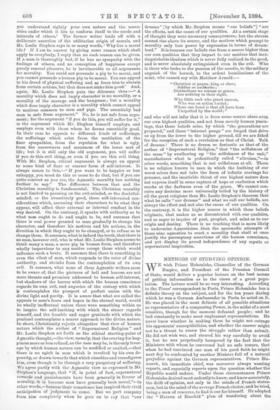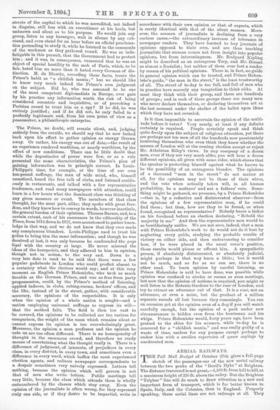METHODS OF STUDYING OPINION.
WE wish Prince Hohenlohe, Chancellor of the German Empire, and President of the Prussian Council of State, would deliver a popular lecture on the best means of getting information as to the views of a great popu- lation. The lecture would be so very interesting. According to the Times' correspondent in Paris, Prince Hohenlohe has a definite theory on the subject, and for the ten years during which he was a German Ambassador in Paris, he acted on it. He was placed in the most delicate of all possible situations as representative of a conquering Power, in the midst of a most sensitive, though for the moment defeated people ; and he had constantly to make most unpleasant representations. He never knew whether in making them he might not outrage his opponents' susceptibilities, and whether the answer might not be a threat to renew the struggle rather than submit. He did not wish war, and steered his way carefully to avoid it, but he was perpetually hampered by the fact that the Ministers with whom he conversed bad no safe tenure, that when he had convinced one man of his good faith he might next day be confronted by another Minister full of a natural prejudice against the German representatives. Prince Bis- marck, his immediate chief, was moreover always wanting reports, and especially reports upon the question whether the Republic would endure. Under those circumstances Prince Hohenlohe desired most ardently to know, and know accurately, the drift of opinion, not only in the minds of French states- men, but in the mind of the average French elector, and he tried, being a man of resource, to find it out for himself. He adopted the " Haroun al Raschid " plan of wandering about the
streets of the capital to which he was accredited, not indeed in disguise, still less with an executioner at his heels, but unknown and silent as to his purpose. He would join any group, listen to any harangue, wait in silence by any cab- stand, and even stand for an hour before an official proclama- tion pretending to study it, while he listened to the comments of the workmen as they gathered round. He was so inde- fatigable in this pursuit, that the Government had to protect him ; and it was, in consequence, rumoured that he was an object of special hostility to the mob of Paris, which, to be fair, hated him no more than it hated every German of dis- tinction. M. de Blowitz, recording these facts, treats the Prince's habit as " a childish mania ; " but we should like to know very much indeed the Prince's own judgment on the subject. Did he, who was assumed to be one of the most competent diplomatists in Europe, ever gain lay his practice any information worth the risk of being considered eccentric and inquisitive, or of provoking a Parisian crowd to treat him as a spy P If he did, he was entirely justified ; and if he did not, he only failed in a perfectly legitimate and, from his own point of view as a peacemaker, a philanthropic enterprise.
The Prince, no doubt, will remain silent, and, judging entirely from the outside, we should say that he now looked back upon his effort to gather opinion as energy thrown away. Or rather, his energy was out of date,—the result of an experience rendered worthless, or nearly worthless, by the effect of new conditions. There can be little doubt that while the depositaries of power were few, or as a rule presented the same characteristics, the Prince's plan of gaining information was in principle correct. In Louis- Philippe's time, for example, or the time of our own ten-pound suffrage, the man of wide mind, who, himself unnoticed, heard the free talk of clubs, and listened assidu- ously in restaurants, and talked with a few representative tradesmen, and read many newspapers with attention, could learn in a few hours what the dominant class was thinking of any given measure or event. The members of that class thought, for the most part, alike; they spoke with great free- dom, and they knew how to convey in words, however inartistic, the general burden of their opinions. Thomas Barnes, and, to a certain extent, each of his successors in the editorship of the Times, from 1814 down to 1875, were accustomed to gather know. ledge in that way, and we do not know that they ever made any conspicuous blunders. Louie-Philippe used to trust his police to bring him the same information ; and though he was deceived at last, it was only because he confounded the pays legal with the country at large. He never misread the ideas of the bourgeoisie, and they adhered to him in opinion, though not in action, to the very end. Down to a very late date it used to be said that there were a few popular gadabouts in London who could predict almost to a certainty what the electors would say; and at this very moment an English Prince Hohenlohe, who took as much trouble as the German Prince, and was as free from party prepossession, could, by the Prince's method of listening, applied indoors, in clubs, robing-rooms, brokers' offices, and -the like, instead of in the street, gather, with considerable accuracy, the opinions of the respectables. It is only when the opinion of a whole nation is sought—and a .nation employing universal suffrage to express its will— that the method fails. The field is then too vast to 'be covered, the opinions to be collected are too various for comparison, the weight of the mass which remains silent or -cannot express its opinion is too overwhelmingly great. Moreover, the opinion a man professes and the opinion he -acts on are too often different. There is no homogeneity of thought in the enormous crowd, and therefore no ready means of ascertaining what the thought really is. There is a -difference of judgment, of interests, of prejudices in every class, in every district, in every town, and sometimes even a difference in every ward, which baffles the most experienced election agents, and reduces newspaper correspondents to a despair sometimes very naively expressed. Letters tell nothing, because the opinion which will govern is not that of men who write letters. Publics meetings tell very little, because the class which attends them is wholly outnumbered by the classes which stay away. Even the .opinion of the journalists is often wrong, for they represent only one side, or if they desire to be impartial, write in accordance with their own opinion or that of experts, which is rarely identical with that of the silent masses. More- over, the acumen of journalists is declining from a very curious cause,—the extraordinary increase of tolerance in newspaper readers. They have learned to buy journals of opinions opposed to their own, and are thus teaching journalists that success comes not from insight into popular opinions, but from interestingness. Mr. Rudyard Kipling might be described as an outrageous Tory, and Mr. Besant as almost a Socialist; but neither of them ever lost a reader by reason of his political opinions. There is, in fact, no guide to general opinion which can be trusted, and Prince Rohm- lohe's guide," the man in the street," is the least trustworthy of all. The street of to-day is too full, and full of men who in practice have scarcely any temptation to think alike. At most they think with their group, and there are hundreds of groups ; and in each of these groups there are many men who never declare themselves, or declaring themselves act at the last moment under the shelter of the ballot upon ideas which they have not revealed.
Is it then impossible to ascertain the opinion of the multi- tude.before it votes Very nearly, at least if any definite certainty is required. People certainly speak and think quite freely upon the subject of religious education, yet there are perhaps not ten men of all the hundreds now passionately bestirring themselves who even think they know whether the masses of London will at the coming election accept or reject Mr. Atlelstan Riley's views. In any company of a dozen men, even if they are very much alike, you will hear a dozen different opinions, all given with some rider, which shows that the speaker is protecting himself against what be knows to he the possibility of an outrageous blunder. The opinions of a thousand "men in the street" do not matter at all, for the opinions may not be those of their wives, and the vote when actually taken will, in all human probability, be a mothers' and not a fathers' vote. Some- thing might be gathered, we presume, by a Prince Hohenlohe —that is, by a reflective and disinterested observer—from the opinions of a few representative men, if he could find them ; but then, how are they to be found, or when found, recognised as representative ? Nobody bears a ticket on his forehead before an election declaring, "Behold the majority in me." And then the representative men would be so bewilderingly unlike. We are not sure, indeed, that a man with Prince Hohenlohe's work to do would not do it best by neglecting every guide, studying the probable results of victory on either side, and then endeavouring to consider how, if he were placed in the usual voter's position, those results would please or affront him. A sympathetic person, if absolutely disinterested, or absolutely judicial, might perhaps in that way learn a little ; but it would not be much, and so far as we can see, there is no other road. To learn opinion by careful listening, as Prince Hohenlohe is said to have done, was possible while opinion was confined to circles or rooms or even meetings, but now that the opinion of nations is required, you might as well listen in the Botanic Gardens to the roar of London, and try to extract an utterance out of that. It is a roar, not an utterance, or even a noise, but the product of a million separate sounds all lost because they commingle. You can on occasion get at the opinion even of a dog if you will watch carefully enough, but the opinion of a pack under new circumstances is hidden even from the huntsman and his whips. Prince Hohenlohe would, forty years ago, have been
praised to the skies for his acumen, while to-day he is censured for a "childish mania," and was really guilty of a waste of time, useless for any purpose except perhaps to endow him with a swollen repertoire of queer sayings by uneducated men.



















































 Previous page
Previous page